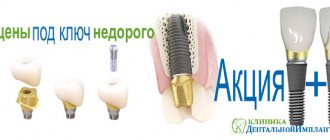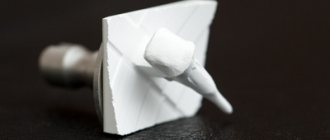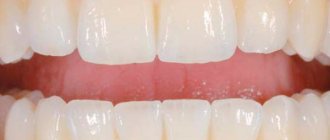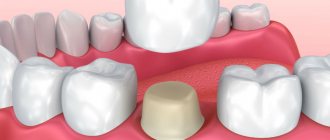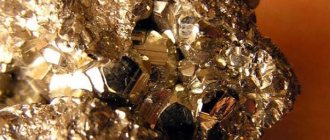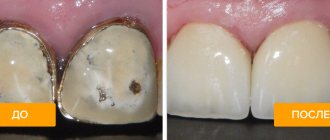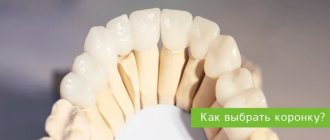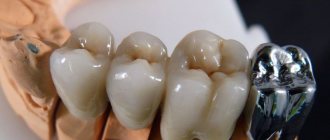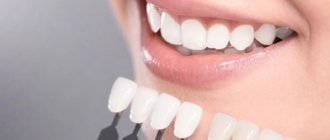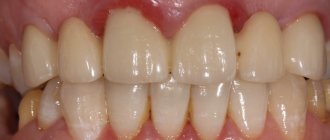Metal-ceramic crowns
This type of crown is ideal for restoring lateral and posterior chewing teeth. They do not fall into the smile area, so high aesthetic properties are not important here. A metal-ceramic crown is a cast metal frame coated with several layers of high-strength ceramics. For the manufacture of the frame, only hypoallergenic medical alloys are used - cobalt and chromium or nickel and chromium. At the request of the patient, the alloy may include precious metals - gold, palladium, titanium, platinum. Their minimum share is 84%. We recommend that you choose a gold alloy that has high biocompatibility and strong bactericidal properties. Its color will give the crowns a natural yellowish tint.
Advantages of metal-ceramic dentures
- They withstand even very heavy physical loads and wear out slowly.
- Compared to other types of prostheses, they have a more affordable price.
- Low risk of developing allergies.
- Their average service life with proper care is about 10-15 years.
Flaws
- Before installation, it is necessary to strongly grind and depulp the tooth, that is, remove living tissue from it and seal the root canals.
- Contraindicated for diseases of periodontal tissues and malocclusions of varying severity.
- Over time, if medical recommendations are not followed, the metal frame may become deformed.
- There may be a metallic taste in the mouth.
- There remains a small risk of developing caries under the crown and tooth sensitivity to hot and cold.
- A significant disadvantage of metal-ceramic crowns is the discrepancy with natural teeth in terms of light transmission, so they stand out for their “brightness” in the dentition. The fact is that the metal frame is opaque to light rays, and they are reflected from it like from a mirror. As a result, the crown looks dull and even slightly grayish, while living teeth are shiny and white. The color of the gum edge adjacent to the artificial tooth also changes slightly.
For prosthetics of the front and lateral chewing teeth, which are clearly visible when smiling and talking, we recommend choosing metal-free crowns - for example, made of pressed ceramics or zirconium dioxide.
Reviews
High-quality metal-free structures receive only positive feedback from patients. They delight with both their appearance, indistinguishable from other healthy teeth, and their quick, painless production.
Fixation can be carried out on a ground tooth or on pre-installed implants . Metal-free crowns on implants can be secured either with cement or with screw fixation.
Even after years of use, many note that the gums do not recede and there is no gray border along the neck of the tooth, characteristic of metal-ceramics. Judging by the reviews on the forums, Emax crowns do not injure the gums, do not cause inflammation or unpleasant odor, which is typical for metal-ceramic dentures. All this is achieved thanks to a perfectly precise fit, eliminating the human factor during modeling.
Another good thing about all-ceramic structures is that with their help you can save even the most hopeless teeth that are destroyed right down to the gums. There are often cases when, by installing a crown on an inlay or a fiberglass pin, dentists restore teeth from which only roots remain.
The only thing that is somewhat frustrating is the price of metal-free crowns, which are 2-3 times higher than similar crowns with a metal frame. But technology does not stand still, and every year all-ceramic prostheses become more and more accessible .
All-ceramic (metal-free) crowns E-max
These prostheses are called all-ceramic, since they are machined from glass-ceramic blanks and do not have a metal frame. Glass ceramics is a unique material, its basis is lithium disilicate. It has good light transmission and a large margin of safety. Each prosthesis is manufactured using CAD/CAM computer modeling technology using individual impressions taken in advance. This allows you to achieve a perfect fit of the prosthesis to the edge of the gum, which means that food particles will not get there and infection will not penetrate.
Advantages of all-ceramic E-max crowns
- High biocompatibility with living tooth and periodontal tissues.
- Low likelihood of developing an allergic reaction.
- The crowns are highly wear-resistant and can withstand significant physical loads.
- There is no need to sharpen the tooth before prosthetics.
- The lightweight and durable design ensures a long service life of the prosthesis - approximately 15-25 years.
- All-ceramic crowns have an incredibly smooth surface, so plaque and tartar deposits do not accumulate on them.
- Metal-free crowns have excellent aesthetic qualities. In terms of their light transmission, they are very close to natural teeth. A rich palette allows the dentist to accurately select the desired shade of the prosthesis. It is almost impossible for a non-specialist to distinguish between a real tooth and an artificial one.
- Crowns retain their original color for a long time.
- Suitable for prosthetics with implants.
The disadvantages of metal-free crowns, as a rule, include their high cost and labor-intensive manufacturing and installation process. All-ceramic crowns are not recommended if, during their fixation, it is impossible to ensure an optimal level of dryness in the oral cavity, otherwise the adhesive seam may lose the necessary tightness in the future. In this case, it is advisable to install metal-ceramic dentures, because the composition for their fixation is not afraid of moisture.
Indications and contraindications for installation
The use of Emax crowns is indicated in the following cases:
✔
change in enamel color;
✔
the appearance of chips, cracks, stains and other aesthetic defects;
✔
restoration of completely destroyed units;
✔
the need for partial restoration of the molar;
✔
prosthetics after implantation in any area of the oral cavity.
Metal-free crowns are suitable for quickly solving many dental problems, but in some cases they are not installed. Contraindications include high tooth wear, bruxism, serious bite pathologies, severe destruction of the central incisors, the presence of a large number of composite fillings that negatively affect the strength of the products, as well as cases where the tooth itself is very dark in color.
Crowns on a zirconium dioxide frame
We can safely say that zirconium dioxide dentures are considered the most advantageous option for restoring front teeth. Artificial teeth made from this material are practically indistinguishable from natural ones. Zirconium dioxide is well known in medicine as a high-strength material and has long been used not only for the manufacture of crowns and bridges, but also for knee and hip joint prostheses. Making a crown from zirconium dioxide is a very complex and labor-intensive process that requires all the knowledge and experience of an orthopedic dentist and dental technician. This is what accounts for the relatively high cost of the prosthesis.
Advantages of zirconium crowns
- Maximum biocompatibility. In its chemical and physical properties, zirconium dioxide is very similar to bone tissue, so the risk of an unwanted allergic reaction is minimized.
- Zirconium dioxide is highly wear-resistant and can withstand severe physical stress. The frame is not subject to deformation, since in the event of microcracks it can restore its structure at the molecular level.
- The average service life of dentures with proper care is 20-25 years.
- Before installation, the tooth is ground as carefully as possible under multiple magnification. This procedure is considered minimally invasive and gentle.
- Due to the low thermal conductivity of the material, a preserved living tooth will not react painfully to sudden changes in temperature.
- All dioxide crowns and bridges are manufactured using high-precision CAD/CAM computer technology from individual impressions. This eliminates loose fit of the prosthesis to the gum and damage to living tissue. The gums retain their healthy natural color and do not swell or bleed.
- Clinical studies show that the formation of plaque and tartar on zirconium dioxide crowns is noticeably lower than on metal-ceramic crowns.
- The doctor carefully selects the color of the crown. Zirconium dioxide has the same light transmission as natural tooth enamel. Zirconium dioxide teeth look exactly like real teeth in any light.
- Such crowns are perfect for implantation prosthetics.
Peculiarities
Before the advent of IvoclarVivadent technology, ceramic crowns were only used on the front teeth due to the risk of chipping. Prostheses made from lithium disilicate crystals do not have such disadvantages: they not only turned out to be stronger, but also made it possible to achieve unsurpassed aesthetics.
Classic ceramics are produced by firing on platinum foil or refractory models, and e.max crowns are made by pressing or 3D milling, which not only increases quality indicators, but also allows you to obtain a monolithic product, in some cases not even requiring the application of additional cladding layers, which eliminates chipping.
Installed bridge on teeth made of ceramics
Temporary crown
The process of making permanent dentures can take up to several weeks. To protect the ground tooth from the adverse effects of the external environment, the doctor will give you a temporary crown made of non-toxic plastic. It can be done right in the dentist's office in one visit.
Pros of temporary crowns:
- Preserving aesthetic function - you don’t have to walk around with a “hole” in your mouth.
- Ensuring chewing function and uniform distribution of load necessary to prevent bone tissue atrophy.
- Protection against pathogens and food particles.
- Prevention of destruction of the prepared tooth.
The disadvantage of temporary crowns is that they wear out quite quickly and will last only a few months. Usually this time is enough for the manufacture and installation of permanent dentures.
What is hidden behind the name “e.max”
Behind the name “e.max” or “E.max” (the correct and official name is IPS e.max) hides a whole range of different materials produced by the German corporation Ivoclar Vivadent, for prosthetics of any complexity - from creating thin veneers or inlays to highly aesthetic crowns In general, the e.max brand means the use of pressed ceramics, which is much stronger than classic ones. But the company additionally offers materials for veneering zirconium dioxide, as well as the material itself to create even more aesthetic and durable restorations.
Only until December 25 South Korean implant Osstem - from 18,500 rubles.
Hurry up to sign up for a free consultation and lock in promotional prices.
Call now or request a call
Opening hours: 24 hours a day - seven days a week
This new generation of dental ceramics has helped make a breakthrough in the field of prosthetics. German specialists have presented the world with truly innovative materials that make it possible to combine high aesthetics with the necessary strength in one orthopedic design without the use of a metal component.
Interesting! The word “ceramics” or “porcelain” translated from ancient Greek means “potter’s clay”. Dentists mastered the material, which after firing acquires very high strength, 200 years ago! This inorganic material is very similar in composition to tooth enamel: it transmits light in a similar way and withstands almost the same loads.

